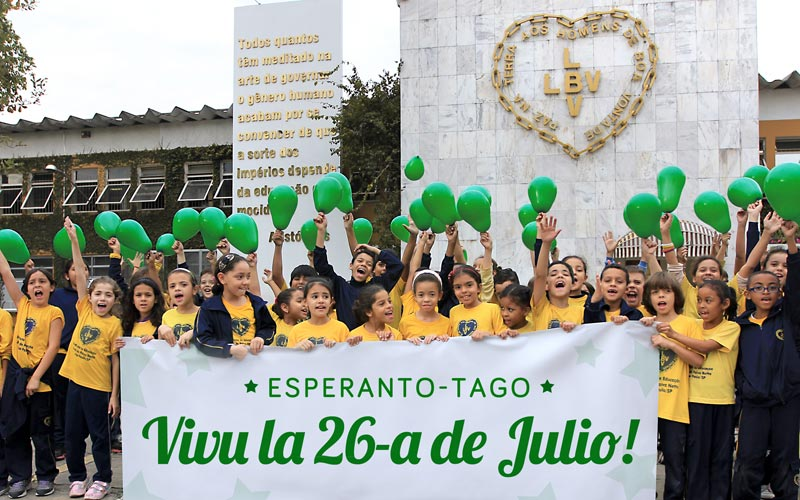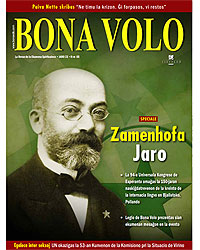
Good Will communications network celebrates the 126th anniversary of Esperanto
By the Editorial Staff
Monday | December 16, 2013 | 4:45 PM | Last update: September 22, 2016, 4:07 PM (Brasilia time)
For over 60 years, the Legion of Good Will expands its message of Unrestricted Ecumenism around the world through the Esperanto language

There is no doubt that Esperanto has been attracting countless people who have employed their very best to propagate the international language. This happens because it offers two very interesting aspects to those who study it: the linguistic and idealistic ones. This last identifies a great deal with the Legion of Good Will—the ideals of Peace and the brotherhood of the world’s nations. The late founder of the LBV, Alziro Zarur (1914-1979), verified the development potential of Zamenhof’s language, allying it to the Organization’s practices. For this reason, the LBV, since its origin, has been upholding Esperanto by all means at its disposal, fulfilling one of its goals: "To work for the widest diffusion of the international language Esperanto, a precious element towards the brotherhood of all nations, considering that the LBV is the Esperanto of religions, just as Esperanto is the LBV of languages”.

Meditadoj kaj Pensoj — Dialektiko de Bona Volo, published in 1988 by writer Paiva Netto, was the first printed book of the LBV in the international language. Its launching was highlighted in an article in the Esperanto magazine, an official organ of the Universal Esperanto Association (UEA), entitled “Brazilian Ecumenical Organization uses Esperanto”, written by Professor Jorge das Neves in the 1980s.
Created in the early days of the Legion of Good Will, the Department of Esperanto has as a goal to get the Unrestricted and Ecumenical message of the Organization across the whole world, employing to this end the international language as a powerful tool towards unity. This all-embracing vision of Ecumenism—that covers the much announced "culture shock”, which can drag entire nations into an unprecedented conflict, perhaps even worse than any recently envisioned—is the vision of journalist José de Paiva Netto, President of the LBV.
A strong supporter of the expansion of Esperanto, Paiva Netto has used it as a tool to leverage Ecumenism, which he sees as Universalism, brotherhood without boundaries and, therefore, a powerful tool to raise nations starting from the practice of Solidarity. "We refer then to the Ecumenism of the Hearts, the one that convinces us not to waste time with hatred and sterile quarrels, but rather to lend a hand to the fallen, for it is touched by the suffering of others; to take our own shirts off to clothe the unclothed; to act as a healing balm for the sick; to protect widows and orphans; it knows that Education with Ecumenical Spirituality will increasingly become fundamental for the progress of nations, because Ecumenism is Education open to Peace”, wrote Paiva Netto in the Solidary Society magazine (7th edition) sent to the UN since the year 2000, and also available in Esperanto.
The Italian-born Corsetti demonstrates his admiration for this ideal: "the LBV, as well as Esperanto, works to build a better world. While Esperanto does that in a cultural and theoretical manner, the LBV achieves that in practice, in a concrete manner, helping people here and now. I wish you all success!”.

Just as the Solidary Society magazine mentioned above, several other publications, by initiative of the leader of the Legion of Good Will, have been translated into Esperanto, such as ecumenical prayers, poems, short stories, texts from the Bible, magazines, newspapers, pamphlets, children’s books, among others. The construction of the Bona Volo Portal also stands out, which is constantly updated with content of diverse subjects interesting to mankind with the differential perspective of Ecumenical Spirituality.
“It is with pleasure that I read and translate texts from the Legion of Good Will. It is a very honorable work for me. Their ideals bring together in a wonderful manner both idealism and practice. The LBV found a very propitious path that has a usefulness no well-meaning man can doubt: solidarity above the details of any creed; philanthropy above the sterile quarrels over faith; education with a moral encouragement; and social support with dignity and respect”. (Paulo Sérgio Viana, Vice President of the Brazilian League of Esperanto - BEL)
Article published in the BONA VOLO [Good Will] magazine issue # 65 that was launched during the 94th Universal Esperanto Congress in Bialystok, Poland.


